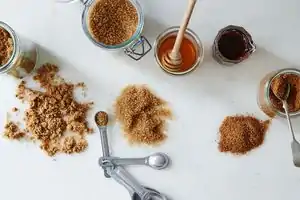Sweeteners
Sweeteners are the variety of products we use to fill our craving for sweets. Tons of diet woo and general food woo are built on them.
| Potentially edible! Food woo |
| Fabulous food! |
| Delectable diets! |
| Bodacious bods! |
|
v - t - e |

Many claims are made by health nuts that natural sugars are better for you, both for losing weight and for health. Many diet gurus have their pet sweetener. And the food industry is endlessly tossing out new products that offer no calories but tons of sweet sweet taste.
Color coded packets
Not to be outdone by the 'gay lifestyle' handkerchief codes, sweeteners have color coding which must be observed at your peril.
- Aspartame (most popularly marketed as "Equal®") — comes in little blue packets. It gained popularity due to being a better-tasting alternative to the slightly bitter alternatives at the time.
- Saccharin — the pink packets, which can taste bitter to some but sweet to others
- Sucralose — the yellow packets, marketed under the name "Splenda®" (not to be confused with the yellow packets marked "Sugar Twin", which is saccharin)
- Stevia (the green packets) tastes like stale licorice. It is derived from the plant Stevia rebaudiana.
- If cyclamates were still marketed in the U.S., they would probably be in the black packets
- Sorbitol, maltitol, and xylitol don't come in color-coded packets
You can avoid all this confusion by just using sugar — although even there, new brown packets of so called "natural golden" sugar are out there to make more of a mess. Of course, if you're diabetic (and not just trying to lose weight), you sort of have to deal with this stuff. Just be aware that the alternative sweeteners don't necessarily act like a preservative the way sugar does: so syrups made with sucralose (Splenda), for instance, spoil quickly whereas sugar syrups don't.
"Natural" sweeteners
- Agave nectar (from Agave spp.)
- Honey (bee vomit)
- Sugar cane (Saccharum spp.) and its derivatives, including molasses. Pure cane juice, "sugar in the raw", and "natural" sugar are basically sugar from sugarcane that have only been partially processed. One of the main reasons (along with indigo, tobacco and cotton) why slavery was brought to the Americas
- Sorbitol
- Stevia
- Lead Acetate. Sugar of Lead. (Which is a poison if you don't know) DO NOT EAT. Notable for having been used as a sweetener in Ancient Rome, which makes you wonder how they lasted as long as they did. Also a "natural" byproduct of storing acidic food (or wine) in lead containers
- Beet sugar: chemically the same thing as cane sugar, it is more expensive to produce than cane sugar but grows naturally in temperate climates and was thus promoted with autarky in mind. An added benefit is that it was never grown with slave labor.
Are zero-calorie sweeteners making you fat?
Public opinion has largely been against artificial sweeteners. They're seen as "cheating" by the weight-conscious, they don't taste like sugar, and they have "artificial" in their name. But opponents of artificial sweeteners often make another claim: That they don't actually help you lose weight, and in fact make your weight problem worse.
A 2011 University of Texas study found that, of 474 diet soda drinkers followed over 10 years, those who drank 2 or more diet sodas per day gained five times as much weight as those who avoided diet sodas altogether.[1] Artificial sweetener opponents offered 2 possible explanations: They slow your metabolism, and they don't satisfy your craving for sweets thus turning you into a sweetaholic. But there's a third possible explanation: correlation does not imply causation. The people in the study who drank more diet soda might have been the people with weight problems, who used diet soda as a tool of weight control.
A 2013 study on European adults found a link between type 2 diabetes and sugar-sweetened soft drinks, but not between type 2 diabetes and artificially-sweetened soft drinks.[2] A 2014 study claimed to find a link between artificial sweeteners and metabolic syndrome, but this study also had problems.[3][4] A 2016 study claimed a possible mechanism for sucralose-sweetened beverage consumption to increase appetite, but it was based on fruit fly and mouse brain experiments.[5]
Other sweeteners tied to woo
References
- Martha Rosenberg, The Truth About Sugar & Sweeteners, Consumers Digest, Sept. 2012
- Romaguera, Consumption of sweet beverages and type 2 diabetes incidence in European adults: results from EPIC-InterAct, Clinical and Experimental Diabetes and Metabolism, 26-April-2013
- Do artificial sweeteners cause obesity?, examiner.com, 26-Sept-2014
- Artificial sweeteners linked to obesity–poor evidence, Linda Tock in Skeptical Raptor's blog, 29-Sept-2014
- Fast Take: Can Low Calorie Sweeteners Increase Your Appetite?, IFIC blog, 14-July-2016